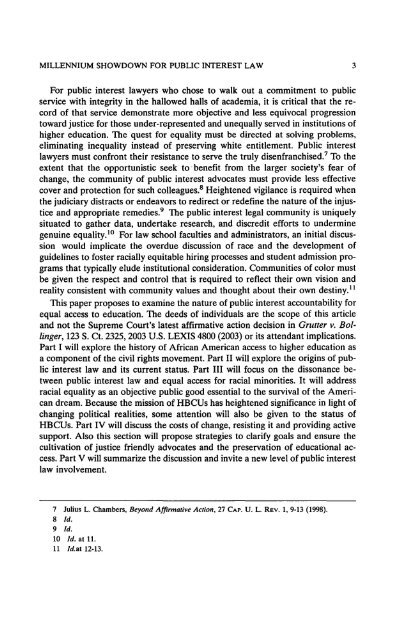Download Electronic Version - UDC Law Review
Download Electronic Version - UDC Law Review
Download Electronic Version - UDC Law Review
Create successful ePaper yourself
Turn your PDF publications into a flip-book with our unique Google optimized e-Paper software.
MILLENNIUM SHOWDOWN FOR PUBLIC INTEREST LAW 3<br />
For public interest lawyers who chose to walk out a commitment to public<br />
service with integrity in the hallowed halls of academia, it is critical that the record<br />
of that service demonstrate more objective and less equivocal progression<br />
toward justice for those under-represented and unequally served in institutions of<br />
higher education. The quest for equality must be directed at solving problems,<br />
eliminating inequality instead of preserving white entitlement. Public interest<br />
lawyers must confront their resistance to serve the truly disenfranchised. 7 To the<br />
extent that the opportunistic seek to' benefit from the larger society's fear of<br />
change, the community of public interest advocates must provide less effective<br />
cover and protection for such colleagues. 8 Heightened vigilance is required when<br />
the judiciary distracts or endeavors to redirect or redefine the nature of the injustice<br />
and appropriate remedies. 9 The public interest legal community is uniquely<br />
situated to gather data, undertake research, and discredit efforts to undermine<br />
genuine equality. to For law school faculties and administrators, an initial discussion<br />
would implicate the overdue discussion of race and the development of<br />
guidelines to foster racially equitable hiring processes and student admission programs<br />
that typically elude institutional consideration. Communities of color must<br />
be given the respect and control that is required to reflect their own vision and<br />
reality consistent with community values and thought about their own destiny. 11<br />
This paper proposes to examine the nature of public interest accountability for<br />
equal access to education. The deeds of individuals are the scope of this article<br />
and not the Supreme Court's latest affirmative action decision in Gruffer v. Bollinger,<br />
123 S. Ct. 2325, 2003 U.S. LEXIS 4800 (2003) or its attendant implications.<br />
Part I will explore the history of African American access to higher education as<br />
a component of the civil rights movement. Part II will explore the origins of public<br />
interest law and its current status. Part III will focus on the dissonance between<br />
public interest law and equal access for racial minorities. It will address<br />
racial equality as an objective public good essential to the survival of the American<br />
dream. Because the mission of HBCUs has heightened significance in light of<br />
changing political realities, some attention will also be given to the status of<br />
HBCUs. Part IV will discuss the costs of change, resisting it and providing active<br />
support. Also this section will propose strategies to clarify goals and ensure the<br />
cultivation of justice friendly advocates and the preservation of educational access.<br />
Part V will summarize the discussion and invite a new level of public interest<br />
law involvement.<br />
7 Julius L. Chambers, Beyond Affirmative Action, 27 CAP. U. L. REV. 1,9-13 (1998).<br />
8 [d.<br />
9 [d.<br />
10 [d. at 11.<br />
11 [d.at 12-13.














